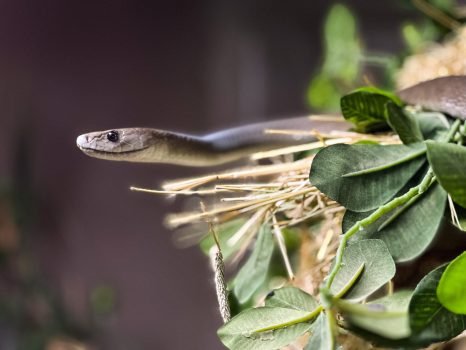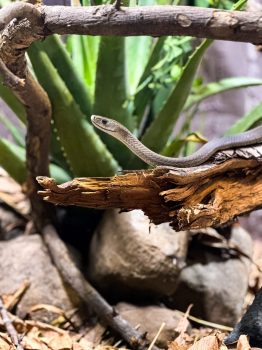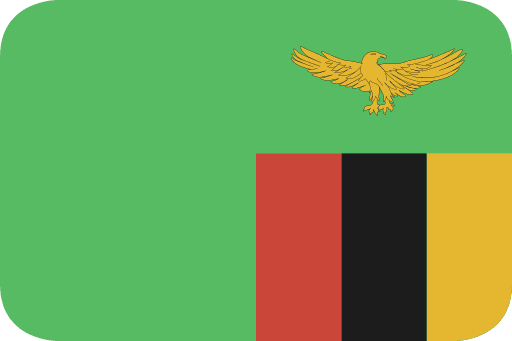Black Mamba
Common Name: Black Mamba
Scientific Name: Dendroaspis polylepis
Names: N/A
Locations: Vaughan and Whitby


Diet
Black Mambas are carnivorous and primarily feed on small mammals, birds, and occasionally other reptiles. They are highly efficient hunters, using their speed, agility, and potent venom to subdue prey.
Average lifespan
In the wild, Black Mambas typically live around 11 years, although some individuals may live longer in captivity.
Size
Black Mambas are one of the longest venomous snakes in the world. They can reach lengths of up to 2.5 to 4.5 meters (8 to 14 feet).
Weight
Adult Black Mambas can weigh between 1.6 to 3.2 kilograms (3.5 to 7 pounds).
About
Black Mambas are native to sub-Saharan Africa, inhabiting a variety of habitats including savannas, woodlands, and rocky areas. They are named for the inside of their mouths, which is black and becomes visible when they open their mouths in a threat display.
Size and behavior
Black Mambas are known for their impressive speed and agility. They are primarily diurnal hunters, actively foraging for prey during the day. Black Mambas are highly alert and aware of their surroundings, often using elevated vantage points to scan for potential prey or threats.
Diet and nutrition
Black Mambas primarily feed on small mammals such as rodents and birds. They hunt by actively searching for prey or by ambushing them from concealed positions. Once they catch their prey, they deliver a series of rapid strikes with their highly toxic venom, which quickly immobilizes their victims.
Conservation status
Black Mambas are currently listed as “Least Concern” by the International Union for Conservation of Nature (IUCN). However, habitat loss, persecution by humans, and illegal trade pose threats to their populations in some regions. Conservation efforts focused on habitat protection, education, and responsible snake management are important for the long-term survival of Black Mambas.
Fun fact
Despite their reputation as highly venomous and dangerous snakes, Black Mambas are generally shy and prefer to avoid confrontation with humans. They will typically retreat if given the opportunity and will only become aggressive if cornered or provoked.
Call or visit your local Reptilia Facility to learn how you can adopt one of these amazing reptiles.










